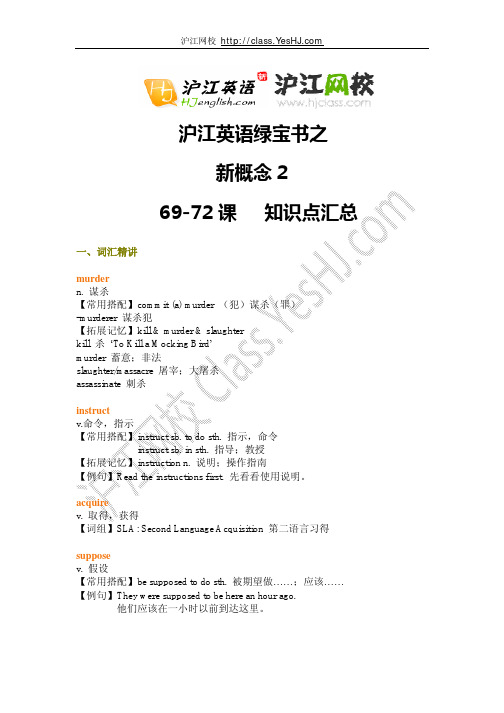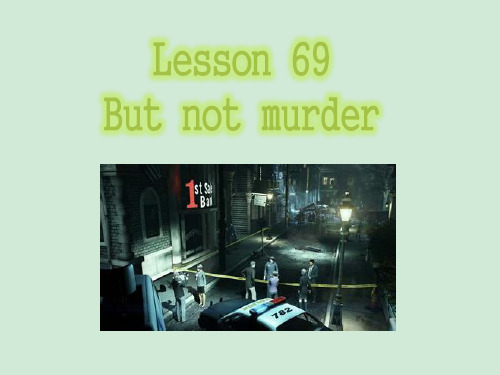新概念英语第二册笔记_第69课
新概念英语第二册69课课后习题详细答案

新概念英语第二册课后习题答案详解Lesson 69练习答案Key to written exercises1.关键句型练习答案A was being tested(1.1);had been asked(11.1-2);After having been instructed(11.2-3); must have been pleased(1.5);could be heard(1.9); were both thrown forward(1.10)2.难点练习答案1 enjoy…practi sing2 amused3 advised…licence4 entertain5 entertained6 amused3.多项选择题答案1. a根据课文第3-4行I began to acquire confidence. Sure I had passed 可以看出只有a. He was sure that he hadn’t failed this time (他确信他这次考试没有失败)与课文所描述的情况相符,而其他3个选择虽然都是课文提及的内容,但不合乎逻辑。
2. b根据课文第6-11行可以判断只有b. he didn’t stop quickly enough (他停车不够快)是他考试没有通过的原因,而a. he ran over a child 与课文实际不符,因为只是假设有一个小孩穿过马路,c. 和d. 虽然都是课文所提及的情况,但不是他考试失败的原因,所以应该选b.3. c只有选c. was testing 最合乎语法,而其他3个选择都不符合语法和题目意思。
4. b前一句中的must have been 表示猜测,意思为想必是.a. had to be (不得不), c. was certainly (确定无疑的), d. should be(应该)这3个选择都与must have been 的含义不太一样,只有b. was probably(可能是)与其含义相同,因此应该选b.5. b前一句Let us suppose that a child suddenly crosses the road 中的主要动词suppose 和从句中的crosses都是一般现在时,表示当时发生的动作,意思为"让我们假设一个小孩突然穿过马路".该句只有选b. Imagine it happening (想象它正在发生)才与前一句含义相符合. a. would happen 是过去将来时, c. had been happening 过去完成进行时, d. will have happened 将来完成时.这3个选择都不能表示现在发生的情况,因为时态都与imagine不符合.6. c该句中的动词continue(继续)后面只能跟名词,动名词和带to的动词不定式才合乎语法。
新概念二第69-72课知识点汇总

沪江英语绿宝书之新概念269-72课知识点汇总一、词汇精讲murdern. 谋杀【常用搭配】commit (a) murder (犯)谋杀(罪)-murderer 谋杀犯【拓展记忆】kill & murder & slaughterkill 杀‘To Kill a Mocking Bird’murder 蓄意;非法slaughter/massacre 屠宰;大屠杀assassinate 刺杀instructv.命令,指示【常用搭配】instruct sb. to do sth. 指示,命令instruct sb. in sth. 指导;教授【拓展记忆】instruction n. 说明;操作指南【例句】Read the instructions first. 先看看使用说明。
acquirev. 取得,获得【词组】SLA: Second Language Acquisition 第二语言习得supposev. 假设【常用搭配】be supposed to do sth. 被期望做……;应该……【例句】They were supposed to be here an hour ago.他们应该在一小时以前到达这里。
tapv. 轻敲【词组】tap on the window 轻叩tap dancing 踢踏舞reactv. 反应【记忆方法】re+act-react【常用搭配】react to 反应【例句】How did she react to the news?她对这个消息反应如何?react against sth. 反抗;反对mournfuladj. 悲哀的-mourn v.【例句】She mourned (for/over) her dead child for many years.她孩子死了多年, 她仍哀伤不已-mourning n.×morningwanderv. 溜哒,乱走【常用搭配】wander around 闲逛wander across/along 蜿蜒曲折(流过)【例句】He wandered in to see me as if he had nothing else to do.他遛遛达达进来看我,好像无事可做的样子【常用搭配】go for a wander闲逛apparentlyadv. 明显地【拓展记忆】apparent 显而易见的;显得……的apparently & evidently & obviouslyapparently 貌似;看起来;据我所知【例句】He was apparently much surprised at the news.他对那个消息显然感到十分惊异。
新概念英语第二册第六十九

新概念英语第二册第六十九《新概念英语第二册》第69课的内容如下:标题:A poor correspondent课文:I have to admit that I am a poor correspondent. I do not write letters as often as I should. There are times when I can produce nothing but the barest apologies for my neglect, but I cannot go on like this.I have many excuses, but none of them are very convincing. I cannot blame my work, because I am only employed part-time. This leaves me plenty of time to write letters, yet I never seem to find the time.I could blame my social life, but I do not want to make excuses. I am sure that most people have as busy a social life as I have and manage to keep in touch with their nearest and dearest. It is not only the amount of time that is needed, but also the willpower to sit down and write.I have tried setting aside a regular time for writing letters, but this has not worked either. I know that if I had a family or a sweetheart to write to, I would find the time. It is only because I have none of these that I cannot find the time.I do not know what to do. I cannot go on like this. I want to be a better correspondent, but I seem to be unable to put my good intentions into action. I must do something about it.译文:我不得不承认我是个不勤于写信的人。
新概念二 69课

一段时间
Though the sound could be heard clearly, it took me a long time to react.
It takes sb. some money/ some time to do sth.
I suddenly pressed the brake pedal hard and we were both thrown forward.
我们再回顾一下ing结构和过去分词结构:
I tried to avoid meeting him. I set out 10 minutes earlier than usual.
Trying to avoid meeting him, I set out 10 minutes earlier than usual.
confident adj. 有信心的, 有把握的
examine /ig'zæmin/ v.
1). 调查,检查,研讨 我们的行李在机场进行了安检. We had our suitcases examined at the airport. 2). 测验 I examined the students in English last week.
front.
pedal /'pedl/ n. 踏板
a brake pedal 刹车踏板 She pressed her foot down sharply on the brake pedal. 她猛踩刹车踏板。
mournful /'mɔ:nfəl/ adj. 令人惋惜的, 悲哀的
There was a mournful look on her face. He said in a mournful voice.
(完整版)新概念二册第69课

• be full of confidence 充满信心
• confident adj. 有信心的, 有把握的
• confident of sth. / confident that
• 我肯定你能得到那份工作
• I’m confident that you’ll get the job.
• 他确信会达到目标
4. (正式)假定,预期;以。。。为条件 The company’s plan supposes a steady increase in orders. 公 司的计划是基于订单将持续稳定增长的预期的。
Lesson 69
But not murder!
suppose
v. 假设
murder n. 谋杀
Hale Waihona Puke mournful adj. 悲哀的
examiner
n. 主考人
tap
v. 轻敲
instruct
v. 命令,指示
brake pedal
react
n. 刹车 n. 踏板 v. 反应
acquire
v. 取得,获得
v.1. be supposed to do sth. (尤指因为规定或掌权者的指 示)被期望做。;应该。You’re supposed to ask the teacher if you want to leave the classroom. 你如果 要离开教室,应该先问问老师。 本应,本该(用于表示某事本应发生而没有发生) The meeting was supposed to take place on Tuesday, but we’ve had to postpone it.这个会本应该星期二举 行,但我们不得不把他推迟了
新概念第二册Lesson 69 But not murder讲义

新概念第二册Lesson 69 But not murder一、单词精讲murder ['mə:də] n.谋杀引申:可引申为破坏(用于形容对美好事物的毁坏,如“murder of the peace”(破坏和平)。
搭配:commit murder(犯谋杀罪);murder case(谋杀案)。
例句:He was accused of committing murder.(他被指控犯有谋杀罪。
)instruct [in'strʌkt] v.命令,指示引申:可引申为教导(知识、技能等),如“instruct students in English”(教学生英语)。
搭配:instruct sb. to do sth.(指示某人做某事);instruct in(教授……方面的知识)。
例句:The teacher instructed the students to finish their homework on time.(老师指示学生按时完成作业。
)词源:由“in -”(在……里)+“struere”(堆积、建造)组成,原义为“在内部构建、装备”,后引申为教导等意思。
acquire [ə'kwaiə] v.取得,获得引申:可引申为养成(习惯等),如“acquire a bad habit”(养成一个坏习惯)。
搭配:acquire knowledge(获取知识);acquire skills(获得技能)。
例句:We should acquire as much knowledge as possible.(我们应该尽可能多地获取知识。
)词源:由“ad -”(到、向)+“quaerere”(寻求)组成,意思是“寻求得到”。
confidence ['kɔnfidəns]n.信心引申:可引申为信任(对人或事物的),如“have confidence in sb.”(对某人有信心)。
新概念第二册课堂笔记Lesson 69

Lesson 69 But not murder!【语法Grammar in use】被动语态(1)被动语态的基本形式:Recently it was damaged by a visitor.最近它被一个客人弄坏了。
(一般过去时)Passing planes can be heard night and day.过往飞机日夜不绝于耳。
(与情态助动词连用)Over a hundred people must have been driven away from their homes by the noise.有一百多人肯定是被噪音逼得已经弃家远去。
(must与被动语态的完成式连用)The bicycle was being sent to his home by train.人们正用火车给他把自行车送回家。
(被动语态用于过去进行时)He never expected the thief to be arrested.他从未指望那小偷能被逮着。
(被动语态用于复合宾语中的不定式结构中)The whole village soon learnt that a large sum of money had been lost.整个村子很快知道,有一大笔钱丢失了。
(用于过去完成时)(2)被动语态还可以用于介词+动名词结构中。
介词(after, before, on)+动名词这个结构通常相当于一个时间状语从句。
如果两个动作中有一个在另一个开始之前已经完成,则可以用after+动名词的完成式表示第1个动作;如果只表示先后顺序,则可用after(或before)+动名词结构;on+动名词通常表示两个动作几乎同时发生:After having been instructed to drive out of town, I began to acquire confidence.在接到把车开出城的指令后,我开始有了信心。
新概念第二册69课单词、课文全解

★instruct 1) v. 指导,向…下命令 • tell 日常用语,运用广泛,语气不强 • order 语气较强,有权威者用来指示别人服从 • instruct & direct 用于客观、公事场合,对需要采 取的行动准确说明 • command 用于军事场合 • The officer commanded his men to fire. 2) v. 教授,传授 instruct sb. in • instructor 教员,教练,指导员 • instruction [C]命令,指示 [U] 传授,指导
★murder • 1) n.谋杀 谋杀案 be guilty of murder 犯谋杀罪 习语:murder will out 纸包不住火 • homicide [‘hɔmisaid] 杀人(犯)killer • manslaughter ['mæ nslɔtə(r)]过失杀人 • Massacre [‘mæ səkə] /slaughter大屠杀 • assassinate [ə‘sæsineit] 暗杀 • poison 毒杀 • suffocate [‘sʌfəkeit]使窒息而死 strangle 勒死 • hang 处以绞刑 • 2). v. murderer murderess
ቤተ መጻሕፍቲ ባይዱ
• I was being tested for a driving licence for the third time. • driver’s licence 驾照 • practice licence 营业执照 • licence plate (美)车牌 number plate(英)车牌 • test • 1)v. 测验,检查 • 我最好是检查一下眼睛 • I’d better have my eyes tested. • 2)n. 考试,试验,检查, • Their affection has stood the test of time. • have a test drive 试车 • test match国际锦标赛
- 1、下载文档前请自行甄别文档内容的完整性,平台不提供额外的编辑、内容补充、找答案等附加服务。
- 2、"仅部分预览"的文档,不可在线预览部分如存在完整性等问题,可反馈申请退款(可完整预览的文档不适用该条件!)。
- 3、如文档侵犯您的权益,请联系客服反馈,我们会尽快为您处理(人工客服工作时间:9:00-18:30)。
Lesson 69 But not murder【Text】I was being tested for a driving licence for the third time. I had been asked to drive in heavy traffic and had done so successfully. After having been instructed to drive out of town, I began to acquire confidence. Sure that I had passed, I was almost beginning to enjoy my test.The examiner must have been pleased with my performance, for he smiled and said, Just one more thing, Mr. Eames. Let us suppose that a child suddenly crosses the road in front of you. As soon as I tap on the window, you must stop within five feet.I continued driving and after some time, the examiner tapped loudly, Though the sound could be heard clearly, it took me a long time to react. I suddenly pressed the brake pedal and we were both thrown forward. The examiner looked at me sadly. Mr. Eames, he said, in a mournful voice, you have just killed that child!'【课文翻译】我第3次接受驾驶执照考试。
按照要求在车辆拥挤的路上驾驶,我圆满地完成了。
在接到把车开出城的指令后,我开始有了信心。
确信我已通过考试,所以我几乎开始喜欢起这次考试。
主考人对我的驾驶想必是满意的,因为他微笑着说:“埃姆斯先生,只剩1项了。
让我们假设一个小孩子突然在你前面穿过马路。
我一敲车窗,你必须把车停在5英尺之内。
(车得立即停下来)”我继续往前开着。
过了一会儿,主考人砰砰地敲了起来。
虽然声音听得很清楚,但我过了好一会儿才作出反应。
我突然用力踩紧刹车踏板,结果我俩的身体都向前冲去。
主考人伤心地看着我。
“埃姆斯先生,”他以悲伤的声调说,“你刚刚把那个小孩压死了!”New words and expressions 生词和短语【生词讲解】1.murder n. 谋杀,谋杀案e.g. six murders in one week 一周之内的六起谋杀案be guilty of murder犯谋杀罪。
commit murder进行谋杀v. murder sb with sth 用--谋杀某人e.g. He murdered his wife with a knife.他用刀谋杀了他的妻子。
糟蹋:murder a piece of music 糟蹋了一首乐曲murderer 谋杀犯,凶手murderess 女凶手Kill:(v.)---“杀”,“杀死”。
普通用语。
指任何一种致死行为。
Assassinate(v.)---“暗杀”。
指出于政治目的进行的暗杀行为。
Murder(v.)---“谋杀”,“凶杀”。
指非法地有目的的杀害他人。
Slaughter(v.)---“屠杀”。
尤指为肉食而屠杀;还指错杀或残酷地杀死很多人。
e.g. Two people were killed in a car accident.在一次车祸中有两人丧生。
e.g. President Kennedy was assassinated in Dallas in 1963.肯尼迪总统于1963年在达拉斯被暗杀。
e.g. It is said that one person was murdered on the beach.据说一个人在海滩上被谋杀了。
e.g. Tens of thousands were slaughtered on the battlefields of Macedonia.成千上万的人在马其顿战场上被杀死了。
2.instruct及物动词vt.1)指示,命令,吩咐e.g. He instructed me to deliver it to a customer.他吩咐我把东西送去给顾客。
2)教授;训练;指导[(+in)]e.g. My job is to instruct her in English.我的工作是教她英语。
3)通知,告知e.g. My agent has instructed me that you still owe me $150.我的代理人告诉我你还欠我一百五十美元。
4)【律】委派,委托3. acquire1)v. 取得,获得,学到(知识、技术、语言等),养成(习惯等)e.g. Mary acquired a good knowledge of Chinese in five years' time.acquire a habit of doing sth. 养成……的习惯e.g. Tom acquired a habit of smoking.acquire confidence 获得信心V.1. (正式)购得,(尤指昂贵的或难以得到的东西)e.g. The museum has managed to acquire an important work by Dali.博物馆设法弄到了(西班牙超现实主义画家)达利的一副重要作品。
2)掌握,获得(知识、技能等);(因自己的能力而)赢得(名声).e.g. I look on it as an opportunity to acquire fresh skills.我把这当做是一次学习新技能的机会。
e.g. The team has acquired a fearsome reputation.这支队伍赢得了令人生畏的名声。
Acquire a taste for 开始喜欢上。
e.g. This beer isn’t bad. I’m beginning to acquire a taste for it.这啤酒不错。
我开始爱喝了。
4. confidence名词n.1. 自信,信心,把握[U][(+in)][+to-v][+that]e.g. He lacks confidence in himself.他缺少自信。
2. 信赖,信任[U][(+in)]e.g. We have confidence in the mayor.我们信任这位市长。
to have/lose confidence in sb。
lack of confidence缺乏信心e.g. I have much confidence in him我对他很有信心in confidence 当作秘密e.g. I am telling you this in confidence我现在告诉你的这件事情是个秘密(strict confidence 绝密)confident adj.confident of sth/thate.g. He is confident of victory 他对胜利充满信心e.g. a confident smile一个自信的微笑5. examiner名词n.1. 主考人;检查人;审查员[C]6. suppose及物动词vt.1)猜想,以为[+(that)]e.g. I suppose he is still in town.我想他还在城里。
2)期望;认为必须,认为应该e.g. You're not supposed to take the books out of the room.这些书不能拿出屋去。
3)必须以...为前提e.g. Every effect supposes a cause.任何事的产生都必然有其原因。
★句法运用1)be supposed to do sth. (尤指因为规定或掌权者的指示)被期望做;应该。
e.g. You’re supposed to ask the teacher if you want to leave the classroom.e.g. The me eting was supposed to take place on Tuesday, but we’ve had to postpone it.这个会本应该星期二举行,但我们不得不把他推迟了2) be supposed to be sth. 被相信是。
,被认为。
e.g. The castle is supposed to be haunted.人们相信这座城堡闹鬼。
3)认为;料想;猜想;假定Suppose (that)...e.g. What makes you suppose (that)we’re going to sell the house?你凭什么认为我们准备把这房子卖掉4) (正式)假定,预期;以。
为条件e.g. The company’s plan supposes a steady increase in orders.公司的计划是基于订单将持续稳定增长的预期的。
5) I suppose 我想,我认为 (用于认为某事真是,但不敢肯定)e.g. I suppose he could have shot himself, but where would he have got the gun?我想他可能是开枪自杀的,但他是从哪里得到的抢的?我想(尤用于表示勉强同意某人做某事)I suppose so.e.g. Can we come with you? Oh, I suppose so.我们可以跟你一起来吗?哦,我看可以吧我猜想(用于猜测)6) suppose /supposing 假设,假定(用于要某人设想如果某情况存在会发生什么事)e.g. Look, suppose you lost your job tomorow, what would you do?哎,假设你明天丢掉了工作,你会怎么办呢?7) I don’t suppose(用于非常礼貌地提出要求)e.g. I don’t suppose you’d give me a lift to the station ?我能否顺便搭您的车去车站我以为不会(用于表示某事不大可能发生)8) what’s that supposed to mean?Conj. 假设,假定(用于假设某事发生后带来的后果e.g. It’s no t worth the risk, suppose your mother found out?(非正式)让。
